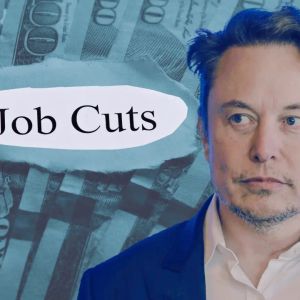Torsten Sløk, chief economist at Apollo Global Management, predicts the layoffs from Elon Musk’s Department of Government Efficiency (DOGE) could reach one million jobs. He warns that early estimates of 300,000 layoffs fail to account for the broader impact on federal contractors. According to Sløk, the federal government’s 5.2 million-person contractor workforce will drop significantly as President Donald Trump and Musk continue pushing for major spending cuts in government contracts and grants. “ 300,000 federal jobs lost is not much. However, studies show that for every federal employee, there are two contractors. As a result, layoffs could potentially be closer to 1 million ,” he surmised. Economist Sløk predicts layoffs will surpass estimates Several sources, including Forbes, reported that over 75,000 federal employees have voluntarily accepted buyouts. At the same time, agencies like the Internal Revenue Service and the Forest Service have already laid off up to 220,000 probationary workers. Sløk noted that in history, layoffs of this magnitude are rare, with a precedent only in Former President Bill Clinton’s efforts from his 1993-2001 term to reduce the size of the federal government. “ Any increase in layoffs will push jobless claims higher over the coming weeks, and such a rise in the unemployment rate is likely to have consequences for rates, equities, and credit ,” the Apollo Global Management partner said. Other economists, like Billionaire investor Steve Cohen, reckon President Trump’s punitive tariffs, immigration crackdown, and deep federal spending cuts driven by DOGE will not board well for the US economy. Cohen, who is the chairman and CEO of hedge fund Point72, said he had turned bearish for the first time in years due to Trump’s aggressive trade policies. “ Tariffs cannot be positive, okay? I mean, it’s a tax ,” Cohen told policymakers last week at the FII Priority Summit in Miami Beach, Florida. “ On top of that, we have slowing immigration, which means the labor force will not grow as rapidly as … the last five years and so .” Will IRS layoffs affect tax season refunds? The Internal Revenue Service’s legislature dictates that the US tax season comes to an end on April 15, but experts now see planned layoffs at the agency leading to severe delays and enforcement issues. According to a Monday report from USA Today, the IRS revealed it has received 7.7% fewer returns compared to 2024. The agency also has processed 7.6% fewer returns through Feb. 7, as revealed in the data published on February 21. Vanessa Williamson, a senior fellow at the Brookings Institution’s Tax Policy Center, said that the mid-season termination of 6,000 IRS employees will result in extended customer service wait times, slower refunds, and an increased number of dropped calls. “ We can expect Americans to experience a return to slower refunds, to longer waits on hold, to dropped calls ,” Williamson said. “ It’s going to be a real impact on customer service right as taxes are due this year. ” She added that an understaffed IRS could make it easier for wealthy taxpayers to evade taxes. “ If you starve the IRS, you’re going to be providing a feast to tax evaders…A lack of enforcement would likely lead to a decline in federal revenue .” Consumer Financial Protection Bureau also targeted for cuts In early February, as reported by Cryptopolitan, the Trump administration announced it had set sights on dismantling the Consumer Financial Protection Bureau (CFPB), cutting its funding, halting its operations, and closing its headquarters. Speaking to news outlet The Hill, a CFPB worker said that Musk’s team will likely go about shutting down the bureau as they did with the US Agency for International Development (USAID). “ I think everyone assumes this is the USAID playbook, and I think everyone’s operating off of the assumption that we’re about to get annihilated, the way that they were annihilated .” Graham Steele, a former Treasury Department official and expert on financial regulations, said the CFPB’s consumer protection efforts are at risk of being shut down entirely. Among the regulations now in limbo is the CFPB’s rule to lower credit card penalty fees from $32 to $8 per fee. Steele cautioned that if the agency is brought down, “many Americans may one day find their bank accounts emptied with nowhere to turn for help.” Cryptopolitan Academy: Coming Soon - A New Way to Earn Passive Income with DeFi in 2025. Learn More



















